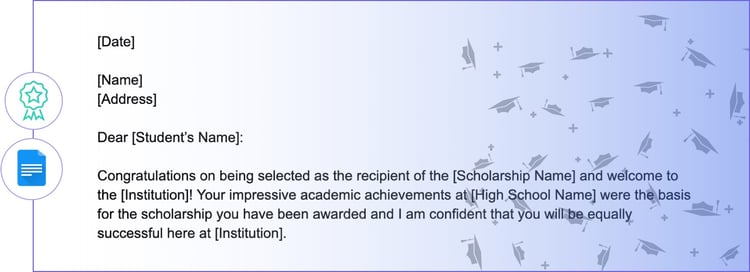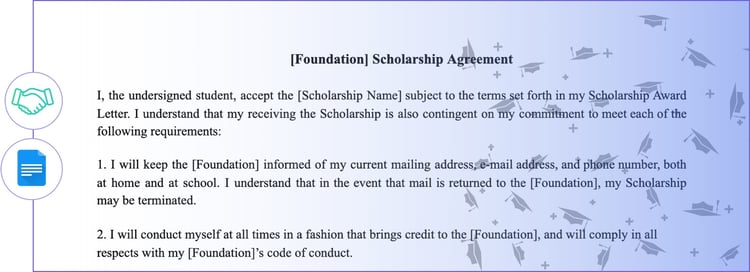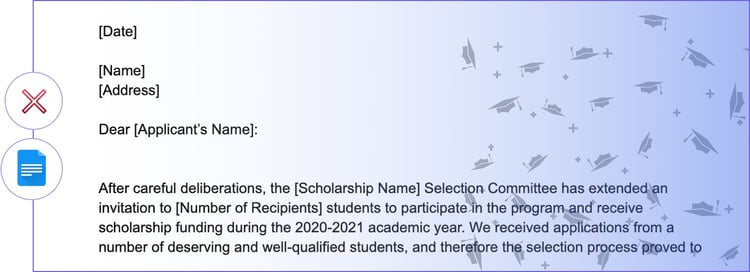Templates for Scholarship Award Letters & Rejection Letters
Better application management of scholarships, grants, awards, and more.

Templates for Scholarship Award Letters & Rejection Letters
The applications have been evaluated. The recipients have been chosen. Now it’s time for the moment everyone has been waiting for. It’s time to write the scholarship award letter, announce the recipients, and celebrate the successful completion of your program.
Of course, the announcement of the recipients also means there were people who were rejected from the prize pool. How do you handle telling them?
Fear not! We’ve got you covered. Below we’re sharing an example of an award letter to send to each scholarship recipient, as well as a scholarship agreement form and a scholarship rejection letter sample.
How to Write a Scholarship Award Letter [+Templates]
We’ll start with the scholarship award letter since this is the piece of correspondence every program applicant is hoping to receive. While you may be tempted to write something simple like “Congratulations! You are the recipient of our scholarship, and the money will be delivered to your university at the start of your next semester,” you’ll actually need to write a little more than that for your recipient.
Clear communication is critical for both your scholarship program and your award recipient. For example, if there are certain rules and regulations related to the award, this is the time to tell your intended recipient.
Scholarship award winners should be aware of things like:
- How long they have to accept the scholarship
- When their college will receive the money
- How many credit hours they must attend in school per semester and what happens if they drop the class before the semester ends
- If there is a grade point average (GPA) that should be maintained
- What happens to the money in the event they change schools or change majors
- Whether or not they need to inform their college about the money, or if they need to inform you of any additional scholarship prizes they have received
- What happens if they fail a class
Of course, what you include in your letter may look different. You’ll have to consider your program’s own unique regulations and values as you write your scholarship award letter. The templates we’ve provided below are just a suggestion, and they don't have to be followed exactly. In fact, you want to adapt them to your specific needs. We hope these help you jump-start the building or optimization of your scholarship program.
-
Scholarship Award Letter Template #1
-
Scholarship Award Letter Template #2
-
Scholarship Award Letter Template #3
-
Scholarship Award Letter Template #4
What Should Be in Your Scholarship Agreement? [+Templates]
Along with your scholarship award letter, you should include a scholarship agreement that addresses each of the conditions required for the acceptance and maintenance of the award like those we mentioned above. A thorough explanation of requirements allows the chosen recipient to decide whether or not they would like to accept the award.
While most people are probably going to accept their award, believe it or not, some will reject it once they learn the terms and conditions that come with the prize. An agreement form is the best way to avoid any miscommunications and to ensure that both parties are protected.
-
Scholarship Agreement Template #1
-
Scholarship Agreement Template #2
-
Scholarship Agreement Template #3
How to Write a Scholarship Rejection Letter [+Template]
We’ll finish with the hardest letter for most scholarship administrators - the rejection letter. It’s certainly not as fun as writing the scholarship award letter, so let’s address why you should send a rejection letter in the first place.
The most important reason for sending a rejection letter is that you don’t want to leave your applicants wondering whether or not they were one of the recipients. Some of the applicants who are working on their budgets for schooling may be waiting to make final decisions based on whether or not they will have that scholarship money coming in.
It’s also just common courtesy to keep applicants informed, and could help your program avoid any bad-mouthing on social media. The last thing you want is applicants flooding your Facebook or Instagram page with negative comments about the fact you didn’t keep in touch.
Another reason to send a scholarship rejection letter is to let them know whether or not there will be additional opportunities to apply for future awards. If so, this could give your applicants time to make improvements before applying again in the next program term.
Finally, your rejection letter is the opportunity to thank your applicant for applying. You want to be professional yet kind. A warm thank-you lets the applicant know you care.
-
Scholarship Rejection Letter Template
Where to Get More Help With Your Correspondence
If you want even more help with writing correspondence such as your scholarship award letter, we recommend using SmarterSelect to run your scholarship programs. Our clients have exclusive access to a community forum where you can share your letters and ask other program administrators for feedback.
We’ve helped countless program administrators make quick work of their own scholarships, and we can help you too. Click here to download our in-depth scholarship management guide for program managers.
FAQs
1. What is the most important factor in writing a scholarship award letter?
Clear communication is a very important factor for both your scholarship program and your award recipient. For example, if there are certain rules and regulations related to the award, you need to convey it clearly to your intended recipient.
2. What should the scholarship award winners be made aware of beforehand?
Scholarship award winners should be made aware of the following things:
-
How long they have to accept the scholarship
-
When their college will receive the money
-
How many credit hours they must attend in school per semester and what happens if they drop the class before the semester ends
-
If there is a grade point average (GPA) that should be maintained
-
What happens to the money in the event they change schools or change majors
-
Whether or not they need to inform their college about the money, or if they need to inform you of any additional scholarship prizes they have received
-
What happens if they fail a class.
You might also like
SUBSCRIBE TO OUR BLOG!
CATEGORIES
- Online Application Software (49)
- Features (33)
- Scholarship software (29)
- scholarship management (21)
- Scholarship Management Software (20)
- scholarship program (15)
- Grant software (14)
- program management (11)
- Award software (10)
- application management (10)
- application management systems (9)
- scholarships (9)
- Corporate scholarships (8)
- Grant Management Software (8)
- Feature Update (6)
- Grantmaking (6)
- Scholarship Funds (6)
- SmarterSelect (6)
- app tree (6)
- grants (6)
- navigation (6)
- Grant compliance (4)
- scholarship program manager (4)
- Conferences (3)
- Grant compliance and reporting (3)
- Product Feature (3)
- grant managers (3)
- scholarship application templates (3)
- Association Software (2)
- Awards management platforms (2)
- Customer satisfaction (2)
- Grant management (2)
- Grant reporting (2)
- Scholarship marketing (2)
- scholarship award letter (2)
- scholarship program template (2)
- scholarship rejection letter (2)
- Awards management software (1)
- Grant lifecycle (1)
- Handling incomplete applications (1)
- How to automate scholarship program communication (1)
- Inspiring employee recognition awards (1)
- International scholarships (1)
- Mathematics scholarships (1)
- Merit based scholarships (1)
- Need based scholarships (1)
- Reverse scholarship (1)
- STEM scholarships (1)
- Scholarship administration (1)
- Scholarship application errors (1)
- Scholarship application management (1)
- Scholarship award management (1)
- Scholarship communication (1)
- Scholarship cycles (1)
- Scholarship disbursement process (1)
- Scholarship fund diversification (1)
- Scholarship fund management (1)
- Scholarship tracking (1)
- Support (1)
- Technology scholarships (1)
- Wizehive pricing (1)
- accept payment (1)
- email productivity (1)
- grant makers (1)
- grantmaking best practices (1)
- payment (1)
- paypal (1)
- post award grant management (1)
- program managers (1)
- scholarship agreement (1)
- scholarship applicant complaints (1)
- scholarship applicant's issues (1)
- scholarship rejection letter template (1)
- wizehire alternative (1)
- wizehive review (1)









